Modular rooms provide a versatile, sustainable and cost-effective solution for modern workplaces, offering the flexibility and durability needed in today’s evolving environments.

September 17th, 2024
Modular rooms are revolutionising workplaces worldwide, replacing traditional fixed-construction rooms that have long been used to provide partitioning and privacy in commercial spaces. As modern workplaces evolve, the need for adaptable, sustainable and flexible environments has grown. Modular rooms address this shift by offering a future-proofed solution that complies with sustainability demands and the varied working styles adopted from the convalescence of working from home.
A modular room is a prefabricated system that balances privacy with collaboration and quality with affordability. This advisory paper compares modular rooms with traditional fixed rooms across seven key areas: sustainability, hybrid working, acoustics, integrated services, construction timelines, cost and compliance.

The rise of hybrid working, where employees split their time between home and the office, has reshaped how workplaces operate. Rather than relying on static, fixed spaces, today’s work environments need to be dynamic and adaptable. Modular rooms meet these demands by providing spaces that can be reconfigured to adapt to the changing needs of the workforce. This can significantly reduce costs and challenges compared to traditional construction methods, which often require time-consuming and expensive modifications.
In terms of sustainability, modular rooms present clear advantages. Prefabrication reduces construction waste and lowers the carbon footprint associated with transporting materials to site. Schiavello, for example, has made sustainability a core aspect of its modular offerings, particularly with its Focus Quiet Rooms. These premium spaces improve privacy and concentration in open-plan offices while maintaining a minimal environmental impact. Constructed using efficient materials, they are easier to build, maintain – and eventually recycle – aligning with modern corporate sustainability goals.
Related: Cox Architecture’s genre-bending reinvention of the workplace as clubhouse

Material efficiency is central to the environmental benefits of modular rooms; the production process ensures that few raw materials are wasted and reduced onsite construction time minimises disruption to daily business operations. Modular designs are eco-friendly and cost-effective, with a lower initial investment compared to traditional buildouts. Over time, the ability to repurpose these rooms further boosts their value, making them a smart long-term investment for organisations committed to sustainability.
Today’s workforce expects spaces tailored to their needs, whether it’s a quiet area for focused work or a collaborative hub for team brainstorming. By integrating modular rooms, companies can create environments that maximise productivity while promoting a sense of conviviality and community.

The ability to create custom spaces that can easily adapt to the evolving needs of the workplace makes them an asset for forward-thinking companies. Whether optimising open-plan office space, creating private pods for concentrated work or designing collaborative zones that foster creativity, these rooms are shaping the future of office design.
The growing popularity of modular rooms reflects a broader shift in how workspaces are perceived. As hybrid working continues to redefine office landscapes, organisations must prioritise spaces that are not only functional but also future-ready. Modular Rooms deliver on multiple fronts.
Schiavello
schiavello.com



Next up: A new era of education at Flinders City Campus by Architectus
INDESIGN is on instagram
Follow @indesignlive
A searchable and comprehensive guide for specifying leading products and their suppliers
Keep up to date with the latest and greatest from our industry BFF's!
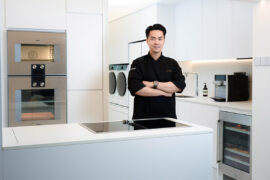
Now cooking and entertaining from his minimalist home kitchen designed around Gaggenau’s refined performance, Chef Wu brings professional craft into a calm and well-composed setting.
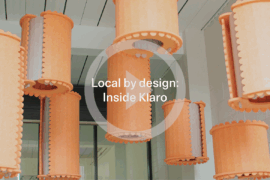
In an industry where design intent is often diluted by value management and procurement pressures, Klaro Industrial Design positions manufacturing as a creative ally – allowing commercial interior designers to deliver unique pieces aligned to the project’s original vision.
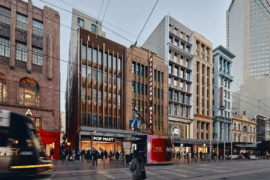
Merging two hotel identities in one landmark development, Hotel Indigo and Holiday Inn Little Collins capture the spirit of Melbourne through Buchan’s narrative-driven design – elevated by GROHE’s signature craftsmanship.
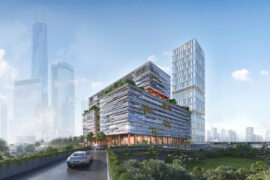
Monash University Malayasia will be making its presence felt with a grand new project in Kuala Lumpur.

AHEC has produced a documentary exploring forestry and stewardship through long-term forest management and human responsibility.
The internet never sleeps! Here's the stuff you might have missed
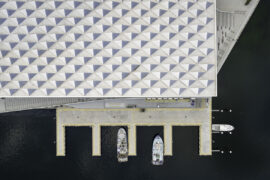
Fred Holt, Catherine Skinner and Louise Pearson join Timothy Alouani-Roby at The Commons to discuss Sydney’s new fish market just weeks after its grand opening.
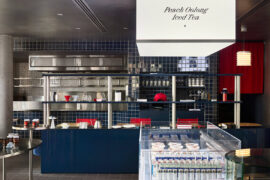
Suupaa in Cremorne reimagines the Japanese konbini as a fast-casual café, blending retail, dining and precise design by IF Architecture.